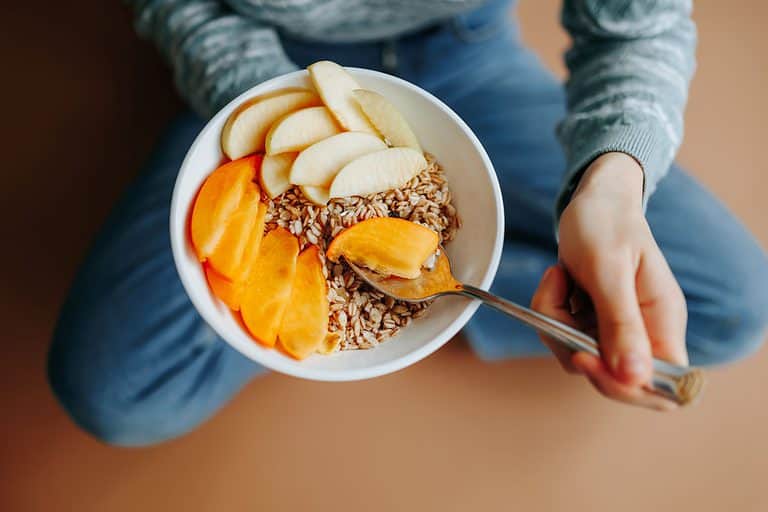45 Best Ways How to Lose Weight Easy Without Exercise
It might be time to shift your perspective if your main focus is on how to get thin or lose weight as rapidly as possible. Diets are unsustainable since limiting your food intake only provides a short-term fix. Making a few minor lifestyle modifications is the greatest method to accomplish long-term, healthy weight loss (and, more importantly, support weight maintenance) without dieting.
Of all, everybody is unique, so the healthy weight loss methods that are effective for one person may not be effective for another. It’s also crucial to keep in mind that a smaller body is not always healthier. Even though the benefits may include a narrowing waistline, try not to focus on a target weight when making changes in your daily habits.
Here is what nutritionists and dietitians had to say when we asked them about natural weight loss and weight maintenance methods that genuinely work even without exercise.

1.Drink plenty of water
Drinking plenty of water is one of the simplest and most beneficial improvements you can make. Staying hydrated is essential to reaching weight loss objectives. Water consumption in large quantities promotes metabolism, aids in toxin removal, and reduces appetite. Aim to consume at least 8 glasses, or roughly 2 liters, of water each day. For a flavor boost, you can also add fresh mint or lemon slices to your water. Keep in mind that water is a calorie-free, natural strategy to support weight loss goals. Don’t undervalue the importance of staying hydrated; make it a top priority on your path to weight loss.

2.Eat fiber-rich foods
The key to a successful weight loss program is eating meals high in fiber. Consuming fewer calories overall is made possible by foods high in fiber, which keeps you feeling full for longer. A healthy gut is supported by fiber, which also enhances digestion. To boost your intake of fiber, increase your consumption of whole grains, fruits, vegetables, and legumes. The best results come from consuming at least 25 grams of fiber per day. A simple and tasty strategy to support your weight loss objectives is to make fiber-rich foods a staple in your diet.

3.Reduce added sugar in your diet
A straightforward yet efficient step towards successful weight loss is reducing additional sugars in your daily life. Added sugars, which are present in processed meals, play a significant role in weight gain and other health problems. Reducing additional sugars in the diet can be extremely beneficial. Try replacing sugary beverages with water and choosing fresh fruits over sugary treats. Your weight loss efforts and general health may benefit from gradually cutting back on additional sugars for good.

4.Get adequate sleep
Any weight loss plan must include getting enough sleep. Hormonal imbalances caused by a lack of sleep may hinder attempts to lose weight. Every night, try to get 7-9 hours of good sleep. The quality of your sleep can be enhanced by sticking to a regular sleep schedule, avoiding electronics before bed, and setting up a peaceful sleeping environment. For best results, don’t undervalue the importance of sleep in your effort to lose weight.

5.Cook more at home
Cooking more at home, which is a simple and successful method. Compared to restaurant or processed foods, homemade meals are often more calorie- and health-friendly. The ingredients and serving sizes are also under your control when you cook at home. Prepare easy-to-follow, wholesome meals for the upcoming week by planning and executing them first. Enjoy yourself while experimenting with new recipes! In addition to helping with weight loss, cooking more frequently at home can also boost general health and reduce costs.

6.Avoid eating late at night
A crucial element of a successful weight loss plan is avoiding late-night eating. Eating after midnight might affect sleep habits and cause weight gain. It’s ideal to finish your final meal of the day at least three hours before going to bed. If you start to get hungry at night, choose a healthy snack like fruit or yogurt rather than anything rich in calories. Avoiding late-night snacking will help you keep better control over your calorie intake and further your weight loss objectives.

7.Reduce stress
Lowering stress is a key component of any weight loss approach. Overeating and weight gain are both symptoms of chronic stress. Engage in stress-relieving activities every day, such as yoga, meditation, deep breathing, or exercise. Additionally, reducing stress can be accomplished by indulging in hobbies, spending time with loved ones, and taking breaks from technology. You can boost your weight loss efforts by controlling your stress levels and preventing stress-related overeating.

8.Reduce sodium intake
Cutting back on sodium is an easy yet effective first step in achieving weight loss success. High salt diets can cause bloating and water retention, which can make it challenging to lose weight. Aim to consume no more than 2,300 mg of sodium per day. Read the labels on your food and choose fresh, healthy foods over processed ones. Gradually cutting back on sodium in your diet will help you lose weight, protect your heart, and keep your blood pressure within normal ranges.

9.Avoid eating when you are not hungry
Refraining from eating when you’re not hungry is an essential component of any weight loss strategy. Overeating and weight gain can result from emotional eating or eating to pass the time. Only eat when you are actually hungry by taking the time to become aware of your body’s hunger cues. When you’re bored or emotional, do something else except food, like read, exercise, or hang out with friends. You may maintain control over your calorie intake and reach your weight loss objectives by eliminating non-hunger eating.

10.Don’t constantly weigh yourself
It can be stressful and frustrating to weigh yourself all the time, especially when trying to reduce weight. Focus on other indicators of progress rather than the scale, such as how your clothes fit, increased energy, and improved health markers. Keep in mind that losing weight is a journey rather than a sprint, and the scale reading is only one part of that trip. Keep a positive outlook on your weight loss journey and celebrate your accomplishments that aren’t measured by the scale. You can keep a positive relationship with your body and remain motivated to lose weight by refraining from over weighing.

11.Focus on progress, not perfection
For a weight loss journey to be successful, one must concentrate on progress rather than perfection. Set attainable, practical goals and acknowledge and appreciate all of your accomplishments. Don’t be too hard on yourself, and if you make a mistake, don’t give up. Instead, learn from your missteps and carry on with your progress. Keep in mind that losing weight is a process, not a final destination. Accept the process and concentrate on implementing long-lasting, beneficial improvements. You may retain a good outlook and stay motivated towards your weight loss objectives by concentrating on progress and not perfection.

12.Get outside and enjoy nature regularly
A healthy weight loss strategy must include regular outdoor activities and time in nature. In addition to boosting mood and increasing physical activity, time spent in nature can lower stress. Whether it’s a stroll through the park, a climb through the mountains, or just relaxing in your backyard, try to spend at least 30 minutes each day outside. Disconnecting from technology and work and refocusing on your health and well-being can be accomplished by surrounding oneself with plants. Your body and mind will be healthier if you incorporate nature into your weight loss efforts.

13.Listen to your body and make adjustments as needed
A key component of a successful weight loss journey is paying attention to your body and making modifications as necessary. Pay attention to how certain foods, activities, and levels of stress influence your body, then adjust as necessary. Never be scared to change your diet or workout routine if it isn’t working for you. Finding a sustainable lifestyle that makes you happy is the most crucial thing. You can make wise selections that support your weight loss objectives and general health by paying attention to your body.

14.Reduce intake of refined carbohydrates
An important part of any weight loss strategy is cutting back on processed carbs. White bread, pasta, and sugary snacks are examples of refined carbs that can quickly elevate blood sugar levels, resulting in weight gain, insulin resistance, and increased cravings. Choose complex carbs instead, like those found in whole grains, fruits, and vegetables. Because they are high in nutrients and fiber, these foods make you feel satisfied and full, which facilitates weight loss. You can have a better, more balanced diet and achieve your weight loss objectives by consuming less refined carbohydrates and more complex carbohydrates.

15.Avoid crash dieting
Crash dieting must be avoided in order to lose weight successfully and sustainably. Crash diets can result in binge eating and yo-yo dieting, are frequently restrictive, and lack necessary nutrients. Instead, concentrate on modifying your eating habits gradually and sustainably by eating more fruits and vegetables, lessening your intake of added sugars, and eating smaller portions. These adjustments can lower your risk of long-term health issues while assisting you in reaching your weight loss objectives in a healthy, balanced manner. Avoiding crash diets will help you develop a better relationship with food and keep a healthy weight for the rest of your life.

16.Avoid eating high-calorie desserts
A weight loss plan should include avoiding sweets with plenty of calories. Desserts like cookies, cakes, and ice cream are frequently laden with sugar and bad fats, which can cause weight gain. Instead, choose tastier sweets that are better for you, like fruit, yogurt, or dark chocolate. These foods help you feel full and satisfied while still fulfilling your sweet desire because they are lower in calories and contain important nutrients. You may stick to your weight loss objectives and keep up a healthy, balanced diet by eliminating desserts that are rich in calories.

17. Obtain sufficient sun exposure
A vital part of a healthy weight loss regimen is getting enough sun exposure. Sunlight is necessary for the formation of vitamin D, which has been associated to better control of weight, stronger bones, and a lower chance of developing certain diseases. In the early morning or late afternoon, try to spend at least 20 to 30 minutes each day in the sun without using sunscreen. Wear protective clothes and limit your time in the sun to reduce your risk of developing skin cancer and skin damage. Your efforts to lose weight and enhance your general health and wellbeing can both be supported by obtaining enough sun exposure.

18.Get support from friends and family
Having the support of friends and family is crucial for a successful weight loss journey. You can stay motivated, accountable, and on track with your goals by surrounding yourself with a supporting network. Talk to your loved ones about your weight reduction journey, and think about joining a support group or finding an exercise buddy. You can do this to conquer challenges, acknowledge accomplishments, and discover fresh motivational strategies. Gaining encouragement from individuals close to you can improve your chances of losing weight and leading a healthy, balanced lifestyle.

19.Try new healthy recipes
An excellent strategy to stick to a weight loss plan is to experiment with new nutritious meals. You can keep your meals interesting and pleasurable while avoiding boredom and the temptation to overindulge in unhealthy foods by experimenting with new ingredients and cooking methods. Look for meals that are nutrient-dense, high in protein and fiber, and low in calories. To add diversity to your meals, think about experimenting with new cuisines or different cooking techniques like grilling or roasting. You can find new favorites, stay motivated on your weight reduction journey, and accomplish your goals by experimenting with new healthy recipes.

20.Practice portion control
A successful weight loss strategy must include practicing portion control. Portion management can help you keep track of how much food you consume and stop overeating, a typical cause of weight gain. To learn more about serving sizes, start with smaller dishes and measure out your meals. Observe your hunger signals and stop eating when you are full, not stuffed. Eating slowly provides your body time to recognize when you are full, which is another benefit. By using portion management, you can more effectively regulate your calorie consumption, advance your weight loss objectives, and keep up a nutritious, well-balanced diet.

21.Get enough vitamins and minerals
An effective weight loss plan must include a balanced diet that provides appropriate vitamin and mineral consumption. You can assist guarantee that you are getting all the necessary vitamins and minerals your body needs to function efficiently by eating a balanced diet that consists of a variety of nutrient-dense foods. Eat a mix of fruits and vegetables, complete grains, lean protein sources, and healthy fats as your main focus. If necessary, think about taking a multivitamin supplement, but remember that food is the finest source of vitamins and minerals. You may support both your weight loss objectives and general health and wellness by eating a balanced diet that provides you with enough vitamin and mineral consumption.

22.Avoid eating out frequently
A great method for someone trying to support their weight loss objectives is to limit their eating out. It might be challenging to manage the ingredients, cooking techniques, and portion sizes of your cuisine when dining out. You might therefore eat more calories, fat, and sodium than you would if you prepared at home as a result. Instead, concentrate on preparing more meals at home with natural, fresh ingredients. This will give you more control over the number of calories and nutrients in your meals and may aid in your efforts to lose weight. You may promote a healthier diet, save money, and feel more in control of your food choices by limiting how often you dine out.

23.Avoid eating high-calorie snacks
A significant step in assisting weight loss objectives is avoiding high-calorie snacks. Snacks make it simple to eat too many calories without realizing it. Although enticing, high-calorie snacks like chips, candy, and baked goods have little nutritious value and can easily undermine your weight loss attempts. Instead, choose a more nutritious snack, such as fruits, vegetables, nuts, or seeds. These snacks offer important vitamins and minerals as well as low calorie, high fiber content, which can help you feel full and invigorated. You may have a major impact on your weight reduction journey and feel secure in your healthy eating choices by staying away from high-calorie snacks.

24.Get adequate zinc intake
A healthy immune system depends on getting enough zinc in your diet. The immune system and the body’s defenses against illness depend heavily on zinc, a vital mineral. It can also aid in the recovery of wounds and the preservation of a healthy sense of taste and smell. Oysters, cattle, pig, poultry, beans, almonds, and whole grains are excellent zinc-containing foods. Consider taking a supplement with the advice of a healthcare provider if your diet does not provide you with enough zinc. Maintaining a strong immune system and warding off illnesses with an appropriate zinc intake will help you achieve your weight loss objectives.

25.Incorporate healthy cooking oils into your diet
A critical step in promoting weight loss and general health is including healthy cooking oils into your diet. Some oils might be damaging to your health because not all oils are made equal. Trans fats and other unhealthy oils, such as hydrogenated oils, can raise your chance of developing heart disease and other chronic health issues. Contrarily, healthy cooking oils like coconut, avocado, and olive oil can have a number of positive health effects. Due to the high concentration of mono- and polyunsaturated fatty acids in these oils, they may be able to cut harmful cholesterol levels and lessen inflammation. Use these oils in place of bad oils when cooking. Additionally, think about utilizing them as the foundation for salad dressings or to flavor your food.

26.Use spices to add flavor without added calories
Limiting your calorie intake is essential for weight loss. However, doing so does not entail forgoing flavor. Without adding extra calories, spices and herbs can be an effective way to flavor your food. The choices are unlimited and include ginger, garlic, cinnamon, and turmeric. Herbs and spices not only enhance flavor, but they also provide a number of health advantages. As an illustration, turmeric and cinnamon both have the ability to reduce inflammation. Incorporate a variety of spices into your diet to add flavor to both your life and your weight loss quest.

27.Drink green tea
In addition to its many other health advantages, green tea has also been praised for its potential to support weight loss. According to research, green tea includes substances that can improve fat oxidation and speed up metabolism. Green tea is a fantastic supplement to a healthy diet because it increases metabolism and is also low in calories and high in antioxidants. For an additional metabolic boost, try substituting green tea for sweetened beverages or snacks. While green tea can be a useful complement to a weight loss regimen, it is crucial to remember that it is not a miracle cure.

28.Limit alcohol consumption
When trying to lose weight, alcohol can be a big impediment. In addition to having a lot of calories, it also increases appetite and clouds judgment, which makes people choose bad foods. One easy but powerful strategy to save calories and aid in weight loss is to limit alcohol consumption. Try limiting your alcohol consumption to a few drinks per week or choose calorie-light options like wine or light beer.

29.Avoid skipping meals
Although skipping meals might seem like a simple approach to save calories, it may have the opposite effect on weight loss. When you skip meals, you run the risk of overeating later and making poor dietary decisions. Regular, well-balanced mealtimes help to keep the metabolism steady and curb overeating. To maintain your energy levels throughout the day and support your weight loss goals, it’s critical to provide your body with the nutrition it requires. So, embrace the next meal instead of skipping it.

30. Limit caffeine intake
Many people consume large amounts of caffeine, yet doing so can hinder attempts to lose weight. Caffeine is a stimulant that can speed up metabolism and heart rate, but it can also make people feel hungrier and crave food. Limiting caffeine intake is crucial for maximizing weight reduction attempts. Decaf is a good alternative, or you might choose water or herbal tea as a beverage instead. It’s also critical to pay attention to how much caffeine is present in other goods, such as prescription drugs and dietary supplements. You can aid your efforts to lose weight and keep up a healthy, balanced diet by limiting your caffeine intake.

31.Take breaks from sitting regularly
In our culture, spending a lot of time sitting down can be considered normal, yet it can be detrimental to attempts to lose weight. A decrease in metabolism and an increase in body fat have been related to extended sitting. Take pauses and get up and move around frequently to counteract the negative effects of sitting. Simple exercises like rising up, stretching, or going for a brief stroll might be a part of this. You may aid in your efforts to lose weight and enhance your general health by taking regular breaks from sitting and including physical activity in your daily schedule.

32.Avoid eating while watching TV
It can be a typical habit to consume food while watching television or using electronic gadgets, but it can also be detrimental to weight loss goals. We are less mindful of our food intake and more likely to overeat when we are distracted by devices. Furthermore, screen time has been associated with increased snacking and bad dietary preferences. Avoid eating in front of the TV or when using electronic gadgets to boost weight loss attempts. Instead, put your attention on taking your time eating and appreciating each bite. To get the most fun and satisfaction out of your meals, create a calm, distraction-free setting.

33.Increase protein intake
Protein is a necessary food that is vital for weight loss. It assists in keeping you full and content and lessens the need to nibble on bad foods. Including high-protein meals in your diet can also aid in weight loss by boosting metabolism and preserving lean muscle mass. Lean meats, poultry, fish, eggs, dairy products, beans, lentils, and nuts are all excellent sources of protein. To support weight loss attempts, it’s critical to achieve a balance between protein, carbohydrates, and healthy fats in your diet. To get the most advantages, use high-quality protein sources and aim for at least 20 to 30 grams of protein per meal.

34.Avoid processed foods
Processed foods are a major barrier to weight loss since they are frequently heavy in calories, sugar, and bad fats. Additionally, the lack of contentment and increased cravings brought on by these foods might result in overeating and weight gain. Avoiding processed foods and concentrating on complete, nutrient-dense foods are crucial for supporting weight loss goals. This includes entire grains, lean proteins, fresh fruits and vegetables, and healthy fats. You may enhance your general health by avoiding processed foods and putting an emphasis on full, nutrient-dense foods.

35.Use smaller plates
Your efforts to lose weight may be significantly impacted by the size of your plate. Smaller plates can aid in portion control and promote weight loss whereas larger plates can encourage larger servings and overeating. Making your brain believe you’re eating more by utilizing smaller plates can help you feel fuller for longer and have fewer cravings. Additionally, using smaller plates can aid with portion management and calorie restriction. You may manage portion sizes, boost enjoyment, and aid weight loss attempts by utilizing smaller plates and concentrating on nutrient-dense foods.

36.Avoid fad diets
Despite their appearance as a quick answer for weight loss, fad diets can cause more harm than benefit. These diets frequently impose stringent restrictions, banning whole food groups, and resulting in nutrient shortages. By staying away from fad diets and putting your focus on long-term weight loss strategies, you may improve your health, lose weight, and maintain your results over time. It’s crucial to concentrate on implementing long-lasting healthy lifestyle adjustments in order to assist sustainable weight loss.

37. Planning your meals for the week
Planning and preparing meals are essential for successful weight loss. You can manage portion sizes, make sure you’re eating nutrient-dense foods, and lessen the temptation to reach for harmful snacks by adding healthy food alternatives into your meal planning. Meal planning for the week is a good tactic. This is organizing and preparing your meals in advance to make it simpler to maintain a healthy diet and manage portion sizes.

38.Bringing healthy snacks to work place
A healthy diet can include snacks, but it’s crucial to pick foods that are nourishing, help weight loss, and enhance general health. This can be difficult when working because unhealthy snack options might be available. Consider bringing wholesome snacks to work to promote healthy eating practices. Fresh fruit, raw vegetables, yogurt, nuts, and whole grain crackers are a few examples of what falls under this category.

39.Use healthy substitutions in your recipes
Making healthy food choices in the kitchen is essential if you want to reduce weight. Making healthy replacements in your recipes is one easy method to enhance the nutrition profile of your meals and help weight loss efforts. Greek yogurt and avocado are two excellent healthy replacements. Greek yogurt can be used in place of cream cheese or heavy cream, while avocado can be used in place of high-fat components like mayonnaise or sour cream.

40.Avoid eating at fast food restaurants
Despite their seeming convenience, fast food outlets can be a significant obstacle to long-term weight control. These eateries frequently provide foods that are rich in calories, fat, and processing, which can lead to weight gain and have a detrimental effect on your general health. It’s crucial to restrict your intake of fast food in order to reach and maintain a healthy weight. Avoiding fast food restaurants will help you limit your calorie intake, lower your chance of developing chronic diseases, and increase the likelihood that you will successfully lose weight over the long run.

41. Unleashing Your Inner Chef
Sustainable weight loss requires making healthier eating choices, but this does not require sacrificing flavor or satisfaction. For instance, consider substituting high-carb pasta for spaghetti squash or zucchini noodles, cauliflower rice for regular rice, or mashed avocado as a spread in place of butter. By making these small substitutions, you can increase your diet’s variety of nutrients while simultaneously cutting calories. Don’t be hesitant to try out new recipes and use your imagination in the kitchen. It is simpler to follow a healthy eating plan the more diversity you have in your diet.

42.Don’t restrict yourself completely
The concept of limitation and deprivation might frequently seem enticing when it comes to weight loss. However, depriving yourself of all of your favorite foods will not result in long-term weight loss. In fact, it frequently results in bingeing or overeating and can cause feelings of deprivation. Instead, concentrate on striking a balance between your preferred foods and nutrient-rich alternatives. In the long run, sticking to a healthy eating plan might be made easier by allowing yourself the odd pleasure.

43.Experiment with healthy cooking methods such as roasting or grilling
Your efforts to lose weight might be greatly impacted by using healthy cooking techniques. Utilizing different cooking methods, such as roasting, grilling, and steaming, not only improves the flavor of your meal but also lowers the calorie content. For instance, roasting veggies can bring out their inherent sweetness, transforming them into a tasty and nutritious side dish. Fish, vegetables, and grains can be quickly and easily steamed, while proteins can be grilled to lend a char-grilled flavor.

44.Incorporate lean protein sources into your diet
Lean protein sources must be a significant part of your diet if you want to lose weight. Lean protein sources, like chicken breast, turkey, fish, tofu, and lentils, are high in protein, low in fat and calories, and a great addition to a diet for losing weight. A healthy metabolism depends on muscle mass, which protein helps to maintain. Protein also makes you feel satisfied for longer. Lean protein sources can help you avoid overeating and unhealthy snacking, which lowers your calorie intake overall and encourages weight loss. Therefore, you should include lean protein sources in all of your meals.

45.Bring a healthy dish to a party
Parties and other social activities can be particularly alluring and encourage overindulgence in unhealthy meals. While still allowing you to spend time with friends and family, adding healthy eating choices into your social life can support your weight loss goals. Start by bringing a nutritious food to a gathering. Make a tasty dip, a bright salad, or grilled vegetables that everyone will appreciate. In addition to having a nutritious alternative for yourself, you’ll be able to share it with others and promote healthy eating.





